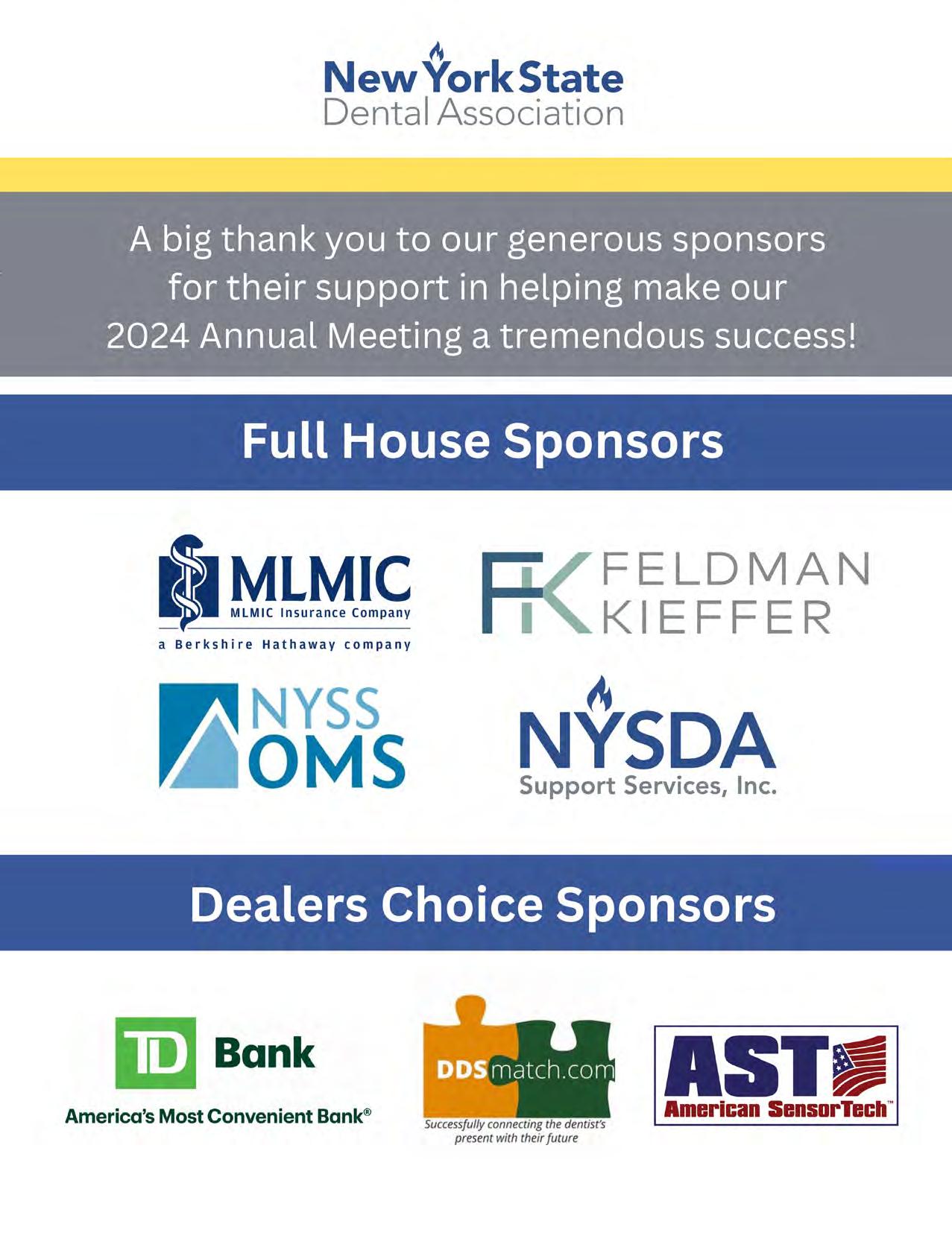
8 minute read
Attorney on Law
New State Laws Provide Further Protections for Patients and Employees
FTC Weighs in with Final Noncompete
Dentists would be well-advised to pay attention to new employment rules, as they apply to practices of all sizes.
Lance Plunkett, J.D., LL.M.
The final, enacted New York State Budget contains some interesting laws that will apply to dental practices and hospitals. New York is consistently changing old norms and focusing on financial protections for patients.
One of the most important changes is a new Section 18-c of the New York State Public Health Law that requires obtaining separate informed consent from patients for clinical services and for payment for such services. The new law takes effect Oct. 20. While many dental practices already follow this model, the law now mandates that informed consent must be obtained from a patient to provide any treatment, procedure, examination or other direct healthcare services separately from the patient’s consent to pay for the services. In addition, consent to pay for any healthcare services by a patient must not be given prior to the patient receiving such services and discussing treatment costs.
Consent is defined as an action which: 1) clearly and conspicuously communicates the individual’s authorization of an act or practice; 2) is made in the absence of any mechanism in the user interface that has the purpose or substantial effect of obscuring, subverting or impairing decisionmaking or choice to obtain consent; and 3) cannot be inferred from inaction.
Other important changes relate to the use of medical credit cards to pay for services, with new laws all taking effect on Oct. 20. The Budget’s changes to the New York State General Business Law created a new Section 349-g that prohibits any hospital or healthcare provider from completing any portion of an application for medical financial products, such as “medical credit cards and third-party medical installment loans,” for the patient or otherwise arranging for or establishing an application that is not completely filled out by the patient.
Curbing Credit Card and Medical Debt Abuse
Also created is a new Section 519-a of the General Business Law, which provides that hospitals or healthcare providers cannot require credit card preauthorizations and cannot require the patient to have a credit card on file prior to providing emergency or medically necessary medical services to patients. Section 519-a of the General Business Law also requires hospitals and other healthcare providers to notify patients about the risks of paying for medical services with a credit card. Such notification shall highlight the fact that by using a credit card to pay for medical services, the patient is forgoing state and federal protections regarding medical debt. The New York State Commissioner of Health has the authority and sole discretion to set requirements for the contents of such notices.
The Budget also amended Section 2807-k of the New York State Public Health Law to prohibit a hospital from commencing a legal action related to the recovery of medical debt or unpaid bills against patients with incomes below 400% of the federal poverty level, which is less than $60,240 per year for 2024. Any legal action related to the recovery of medical debt or unpaid bills by or on behalf of a hospital must be accompanied by an affidavit by the hospital’s chief financial officer stating that, based on the hospital’s reasonable effort to determine the patient’s income, the patient whom they are taking legal action against does not have an income below 400% of the federal poverty level.
Paid Breaks for Lactating Mothers
Due to an amendment to Section 206-c of the New York State Labor Law, as of June 19, all New York employers, regardless of size, are required to provide paid breaks for employees who need to express breast milk for a nursing child. Previously, employers were only required to provide reasonable unpaid break time or permit an employee to use existing paid break or mealtime to express breast milk during the workday.
The new law requires employers to provide 30-minute paid breaks each time an employee has a reasonable need to express breast milk for up to three years following the birth of the child. The law also requires employers to permit employees to use existing paid break or mealtime when nursing breaks longer than 30 minutes are needed. The New York State Department of Labor had previously stated that employees may take lactation breaks at least once every three hours to pump breast milk at work. However, neither the new law nor existing guidance states whether the new paid break time may be used just once or on multiple occasions during a single workday.
Pregnant Employees Entitled to Paid Leave
In a major development, Section 196-b of the New York State Labor Law has been amended to make New York the first state in the nation to require employers to provide paid prenatal leave to pregnant employees. Beginning Jan. 1, all employers will be required to provide employees with 20 hours of prenatal leave. Like the new paid lactation break law, the paid prenatal leave law will apply to all employers, regardless of size. Paid prenatal leave will allow pregnant employees to attend prenatal medical appointments, physical examinations and discussions with healthcare providers related to the pregnancy.
The 20 hours of paid leave for prenatal care is in addition to existing sick and safe leave to eligible employees, as well as paid parental leave under the New York State Paid Family Leave Law. Employees may take paid prenatal leave in one-hour increments and must be paid at their regular rate of pay or the applicable minimum wage, whichever is greater. Employers are not required to pay employees for any unused paid prenatal leave upon separation from employment.
Finally, New York’s COVID-19 Paid Sick Leave Law, which has been in effect since March 2020, will expire on July 31, 2025. It remains in full effect until that date. While the law was no longer deemed necessary, legislators still did not want to end it too abruptly.
Noncompete Law is Final
On a very different employment law topic, the Federal Trade Commission (FTC) published its Final Non-Compete Clause Rule in the Federal Register on May 7, with an effective date of Sept. 4. The FTC final rule is a sweeping ban on noncompete clauses (also known as “covenants not to compete”). Litigation has already commenced to try to block the FTC rule from taking effect, but no result is expected on even a preliminary injunction motion until at least July 23. It is the kind of case that may carry on for a very long time and, eventually, make its way to the United States Supreme Court, because the legal argument is that the FTC exceeded its statutory authority. A summary of the final rule follows.
1. The final rule bans all new noncompete agreements with workers, including senior executives, after Sept. 4, 2024. The rule applies to all employers regardless of size or type of work. Workers are defined to include both employees and independent contractors.
2. The final rule cancels all existing noncompete agreements as of Sept. 4, 2024, except existing noncompete agreements with senior executives. Senior executives are defined to be persons who earn at least $151,164 in total annual compensation in the preceding year and who have job duties as an officer with policymaking authority. The FTC has noted that partners or other owners of a healthcare practice would usually qualify as senior executives.
3. The final rule includes a narrow exception for a bona fide sale of a business.” The FTC defines bona fide sale as a sale “made between two independent parties at arm’s length, and in which the seller has a reasonable opportunity to negotiate the terms of the sale.” There is no percentage ownership threshold for triggering this business sale exception, but the FTC will look at all the circumstances to determine whether there is a legitimate sale of business occurring and if the noncompete agreement is reasonable in relation to the sale of business transaction.
4. The final rule preempts any conflicting state law or state law that is less restrictive than the FTC rule.
5. The final rule bans any contract clauses that “function to prevent” future employment, not just traditional noncompete agreements. Employers will have to be very careful how they draft an employment contract to account for this sweeping prohibition. Semantics will not save an offending provision.
6. The final rule requires employers to notify both current and former employees that their existing noncompete agreements are no longer enforceable as of September 4, 2024, and include model language intended to satisfy this requirement. It should be noted that not all provisions of the existing noncompete agreements are canceled, just the noncompete provisions. For example, an accompanying item like severance pay is not voided.
7. The final rule provides that issuing a noncompete agreement or otherwise failing to comply with the rule is a violation of Section 5 of the FTC Act. Therefore, noncompliance can result in fines, penalties and injunctive relief—all penalties/remedies the FTC can use under the FTC Act.
Given the FTC’s action, and regardless of whether any litigation ultimately succeeds in blocking such action, dentists should now carefully review all existing and any proposed new noncompete agreements with a knowledgeable attorney. Planning ahead will be a critical part of managing a dental practice in this regard.
The material contained in this column is informational only and does not constitute legal advice. For specific questions, dentists should contact their own attorney.











